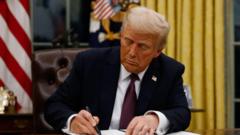Experts highlight concerns regarding animal welfare under a possible second Trump administration
What a Second Trump Term Could Mean for Animal Welfare

What a Second Trump Term Could Mean for Animal Welfare
Exploring the potential impacts of a Trump re-election on animal rights and environmental policies
In the landscape of U.S. politics, the implications of Donald J. Trump securing a second term extend far beyond human interests, significantly impacting the lives of animals across various ecosystems. From wild animals in their natural habitats to those confined in farms or research settings, the potential policy shifts herald extensive changes.
Animal law experts, such as Ann Linder from Harvard University, indicate that federal regulations play a crucial role in the welfare of numerous animal species. Linder emphasizes, “The federal government dictates a lot about the lives of all different kinds of animals.” As Trump’s campaign seems to prioritize industrial interests, there's apprehension regarding the future of animal rights.
While Trump's initial term saw some positive developments for animal welfare, like criminalizing extreme animal abuse, many advocates argue that these were overshadowed by policies favoring industry regulations. The anticipated commitment to deregulation has experts like Nancy Blaney from the Animal Welfare Institute worried about the negative repercussions for animals. “We’re very concerned that deregulation can come at the expense of animals,” Blaney explains.
The outlook for wild populations seems equally grim, especially in the context of climate change. Photographic evidence of bleached corals in places like the Florida Keys highlights the fragility of ecosystems that could suffer under relaxation of protections. Under a re-elected Trump, there’s growing dread about the fate of wildlife.
In conclusion, a second Trump administration may steer wildlife regulations and animal welfare policies toward a less protective stance, paving the way for increased challenges faced by nonhuman creatures.
Animal law experts, such as Ann Linder from Harvard University, indicate that federal regulations play a crucial role in the welfare of numerous animal species. Linder emphasizes, “The federal government dictates a lot about the lives of all different kinds of animals.” As Trump’s campaign seems to prioritize industrial interests, there's apprehension regarding the future of animal rights.
While Trump's initial term saw some positive developments for animal welfare, like criminalizing extreme animal abuse, many advocates argue that these were overshadowed by policies favoring industry regulations. The anticipated commitment to deregulation has experts like Nancy Blaney from the Animal Welfare Institute worried about the negative repercussions for animals. “We’re very concerned that deregulation can come at the expense of animals,” Blaney explains.
The outlook for wild populations seems equally grim, especially in the context of climate change. Photographic evidence of bleached corals in places like the Florida Keys highlights the fragility of ecosystems that could suffer under relaxation of protections. Under a re-elected Trump, there’s growing dread about the fate of wildlife.
In conclusion, a second Trump administration may steer wildlife regulations and animal welfare policies toward a less protective stance, paving the way for increased challenges faced by nonhuman creatures.























